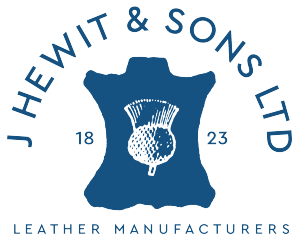
November 2021
World's Best Piper

SFU (Simon Fraser University) Pipe Band Pipe Sergeant Jack Lee captured the 2021 Glenfiddich Piping Championship on October 30 at Blair Castle in Blair Atholl, Scotland with a 2nd in the Piobaireachd event and 3rd in the March, Strathspey & Reel event.
It is Jack's third time winning the Glenfiddich Piping Championship, following his capture of the title in 2003 and 2017. Jack was using a bag made from Hewit's Bagpipe Sheepskin.
It also comes on the 40th anniversary of his first appearance in the Glenfiddich Piping Championship in 1981, as a result of winning the Gold Medal and Silver Star at the Northern Meeting in Inverness that year.
Our warmest congratulations go to Jack.
COP26 - UN Climate Change Conference of the Parties
Our Materials Impact our Climate
The world needs materials that are sustainable, renewable, recyclable, biodegradable, and most importantly, do not add to the burden of atmospheric carbon.
Natural fibres, such as leather, cotton, wool, mohair, alpaca, silk, hemp and mycelium, are part of the biogenic carbon cycle and as such are comprised of carbon that has been in the atmosphere for a millennia.
These readily available raw materials, when ethically and properly produced, are an important replacement for fossil fuels, reducing the need for its extraction and retaining more carbon in the earth.
Furthermore, at the end of life, properly produced natural materials will biodegrade, limiting their impact and mitigating harmful emissions, such as microplastic pollution, often associated with the synthetic materials that they replace.
With particular reference to leather, the leather manufacturing sector upcycles an unavoidable waste from the food industry, to produce a versatile, durable, unique material, ideal for the circular economy that the world must move towards.
However, these same materials are often dismissed through a lack of understanding of the manufacturing process and its supply chain, or through the application of questionable science generally in the form of incomplete and incomparable or out-dated Life Cycle Assessments (LCAs), and the marketing of new, often fossil fuel-based materials claiming unsubstantiated levels of sustainability.
As shown by some emerging climate science studies, such as the GWP* model, production and use of biogenic materials typically does not add to the warming burden of the atmosphere, and where it does, the effects are short-lived. This is in contrast to materials produced from fossil-fuels, which release carbon that has been locked in the earth's core for a millennia, and will persist in the environment, contributing to climate change.
Therefore, we, the undersigned organisations, call on the COP26 forum to...
...Recognise the cyclical, climate efficient nature of natural fibres and their potential for a positive contribution to reducing the climate impacts of consumer products.
...Encourage the use of natural fibres wherever feasible and reduce unnecessary reliance on fossil-fuel-based materials.
...Support LCA methodologies that accurately account for the environmental impact of fossil-fuel based materials, including end of life properties.
...Promote 'slow fashion', durable products, and items that can be used many times, repaired and refurbished, and last for years.
Signatories to the Leather Manifesto
Asociación Española del Curtido (ACEXPIEL - Spanish Tanners' Association)
Associação Portuguesa dos Industriais de Curtumes (APIC - Portugal Tanners' Association)
Association of Dutch Hide Traders (V.N.H.)
Australian Hide Skin and Leather Exporters' Association Inc. (AHSLEA)
Cámara de la Industria de Curtiduría del Estado de Guanajuato - México (CICUR)
Cámara Nacional de la Industria de Curtiduría - México (CANALCUR)
Centre for the Brazilian Tanning Industry (CICB)
Centro Tecnológico das Indústrias do Couro (CTIC - Leather Center in Portugal)
China Leather Industry Association
Confederation of National Associations of Tanners and Dressers of the European Community (COTANCE)
Dutch Association of Leather Chemists & Technicians (NVLST)
International Council of Hides, Skins and Leather Traders Association (ICHSLTA)
International Council of Tanners (ICT)
International Union of Leather Technologists and Chemists Societies (IULTCS)
Fachverband der Textil-, Bekleidungs-, Schuh- und Lederindustrie - Berufsgruppe Ledererzeugende Industrie (Austrian Association of Textile, Clothing, Shoe and Leather Industry - Leather Producing Industry Group)
Fédération Française des Cuirs et Peaux (French Hides & Skins Association)
Fédération Française Tannerie Megisserie (French Tanners Association)
Leather and Hide Council of America
Leather Cluster Barcelona
Leather Naturally
Leather UK
Leather Working Group
One 4 Leather
Society of Leather Technologists and Chemists
Sustainable Leather Foundation
Swedish Tanners Association
Turkish Leather Industrialists Association (TLIA)
UNIC Concerie Italiane (Italian Tanneries Association)
Verband der Deutschen Lederindustrie e.V. (TUV - German Leather Federation)
Wirtschaftsverband Häute/Leder (WHL - German Hide and Leather Association)
Zimbabwe Leather Development Council
